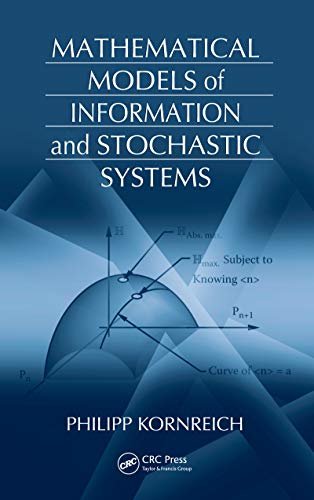
Mathematical Models of Information and Stochastic Systems (English Edition)
- 作者
- Philipp Kornreich
- 语言
- 英语
- 出版社
- CRC Press
- 出版日期
- 2018年10月3日
- 纸书页数
- 376页
- 电子书格式
- epub,pdf,mobi,azw3,txt,fb2,djvu
- 文件大小
- 14912 KB
- 下载次数
- 3236
- 更新日期
- 2023-04-04
- 运行环境
- PC/Windows/Linux/Mac/IOS/iPhone/iPad/iBooks/Kindle/Android/安卓/平板
内容简介
From ancient soothsayers and astrologists to today’s pollsters and economists, probability theory has long been used to predict the future on the basis of past and present knowledge. Mathematical Models of Information and Stochastic Systems shows that the amount of knowledge about a system plays an important role in the mathematical models used to foretell the future of the system. It explains how this known quantity of information is used to derive a system’s probabilistic properties. After an introduction, the book presents several basic principles that are employed in the remainder of the text to develop useful examples of probability theory. It examines both discrete and continuous distribution functions and random variables, followed by a chapter on the average values, correlations, and covariances of functions of variables as well as the probabilistic mathematical model of quantum mechanics. The author then explores the concepts of randomness and entropy and derives various discrete probabilities and continuous probability density functions from what is known about a particular stochastic system. The final chapters discuss information of discrete and continuous systems, time-dependent stochastic processes, data analysis, and chaotic systems and fractals.
By building a range of probability distributions based on prior knowledge of the problem, this classroom-tested text illustrates how to predict the behavior of diverse systems. A solutions manual is available for qualifying instructors.
Mathematical Models of Information and Stochastic Systems (English Edition) EPUB, PDF, MOBI, AZW3, TXT, FB2, DjVu, Kindle电子书免费下载。
- 超维篮球 棋羽落定
- 纯禽老公不靠谱第1卷(阅文白金大神作家作品) 囧囧有妖
- 钻石王牌之全能棒球手 飞熊骑士
- 将夜(第1卷)(阅文白金作家《庆余年》作者猫腻的玄幻大作,影视剧原著小说) 猫腻
- 有一种信仰叫足球 刺客柔情
- Handbook of Food Engineering (English Edition) Dennis R. Heldman、Daryl B. Lund、Cristina Sabliov
- 我是汉字听写英雄:给孩子讲最美的汉字(红宝石卷) 快乐语文教研组
- 重生小夫妻第1卷 夜雨风华
- 恨妻:豪门老婆夺夫 南湖微风
- 隐婚娇妻:老公,心尖宠(阅文白金大神作家作品) 沐衣衣
- 海洋战国策:邵永灵论海洋大国崛起 邵永灵
- 爆笑萌宠:开吃吧,兽夫大人! 玉扇傾城
- 篮球场上的马尾辫 O2
- Analysis and Design of Steel and Composite Structures (English Edition) Qing Quan Liang
- 风水点命师第5卷 佛祖是爷们
- 人口流动与社会融合:理论、指标与方法 肖子华、徐水源
- Measurement, Data Analysis, and Sensor Fundamentals for Engineering and Science (English Edition) Patrick F. Dunn
- Geotechnical Centrifuge Technology (English Edition) R.N. Taylor
- 深度蜜爱:腹黑老公,悠着点!(阅文白金大神作家作品) 雪如歌
- 足球皇帝第5卷 天天不休
- Introduction to Genomic Signal Processing with Control (English Edition) Aniruddha Datta、Edward R. Dougherty
- Constructed Wetlands for the Treatment of Landfill Leachates (English Edition) George Mulamoottil、Edward A. McBean、Frank Rovers
- Handbook of General Surgical Emergencies (English Edition) Sam Mehta、Andrew Hindmarsh、Leila Rees
- Microelectrofluidic Systems: Modeling and Simulation (Nano- and Microscience, Engineering, Technology and Medicine Book 3) (English Edition) Tianhao Zhang、Krishnendu Chakrabarty、Richard B. Fair
- Morbidity, Performance and Quality in Primary Care: A Practical Guide, v. 2 (English Edition) Gert P. Westert、Lea Jabaaij、Rajat Chowdhury、Els Borst-Eilers
- 卡牌篮球 尸身人面
- 高职院校课程教学质量评价体系的研究与实践 孙新铭等
- Constructive Conversations About Health: Pt. 2, Perspectives on Policy and Practice (English Edition) Marshall Marinker、Fritjof Capra
- 我的初恋是女鬼第1卷 古明月夜
- 爆笑穿越:草包傻王妃 一夜绯色